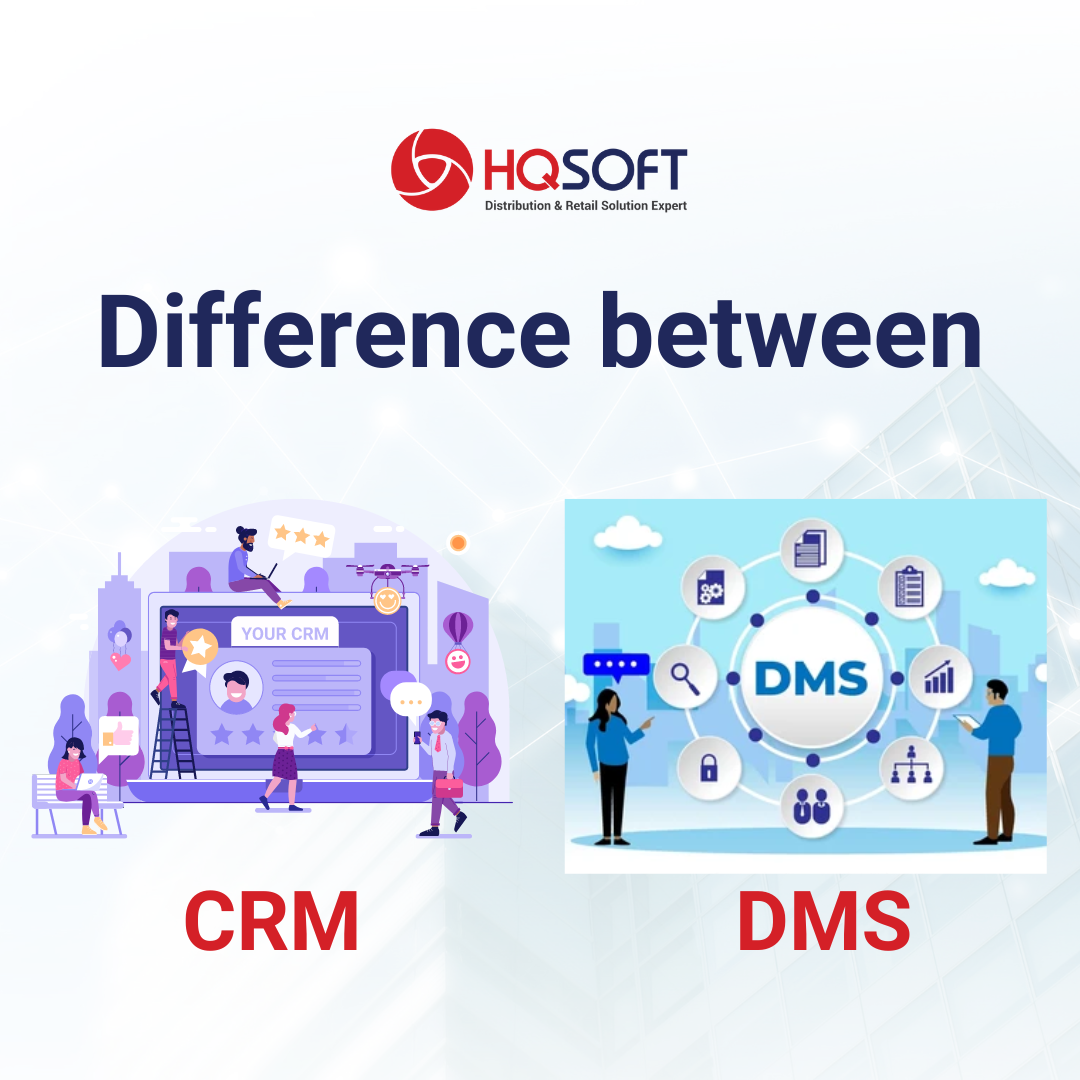With the current development of technology, the application of software in management will help businesses optimize management and operation time. In particular, DMS and CRM software are both effective management support software. However, many businesses still need clarification on the similarities; these are two separate software with different features and uses. Let’s learn about the difference between DMS and CRM software with HQSOFT!
DMS – Distribution management system – is enterprise management software to help manage the distribution of goods to the market, developments in distribution channels, including management of market staff, sales automation, inventory control, market fluctuations, management of promotions, and trade programs to promote a point of sale, debt management…
CRM – Customer Relationship Management – is software specializing in customer management and care. It can be understood simply that the business manages the interaction and care activities with its customers to form loyal customer relationships with the business.
DMS and CRM software both operate on a cloud computing platform that allows users to access data through the Internet anywhere, through mobile devices or computers.
DMS and CRM are both technology solutions with convenient applications, capable of actively expanding users based on the size of the business, helping businesses modernize the way they work more professionally – more efficiently.
DMS and CRM software both have a Sales Management module with the common benefit of automating the sales process, allowing interaction with customers at all times, and supporting throughout the sales process from being a customer leads until it turns into a business opportunity. However, the sales management part of CRM will not be as intensive as a DMS to be able to manage details of promotions, discounts, and other sales policies and link with other sales targets employees for customers.
DMS and CRM can both be integrated into one ERP software. Because ERP is a total solution in business administration, some modules of ERP also include DMS and CRM functions such as inventory management, product distribution management, sales management, customer service, customer management, etc.

| DMS | CRM | |
| Short name | DMS – Distribution Management System | CRM – Customer Relationship Management |
| Purpose of use | Modernize the distribution channel management method, reduce manual operations of the market sales team, and connect from Manufacturer – Distributor – Point of Sale. Thereby reducing costs, and improving employee productivity. | Improve the efficiency of approaching and communicating with customers in a scientific way to increase revenue and increase a strong relationship with customers. |
| Subjects of application | Only suitable for businesses operating in the field of production & distribution. | Suitable for most businesses in all sectors. |
| Management object | Manage all elements on the distribution channel from Manufacturer – Distributor – Dealer/point of sale | Manage all elements on the distribution channel from Manufacturer – Distributor – Dealer/point of sale Management of customers and business partners. |
| Department should apply | – Salesman – SUP, ASM, RSM – Trade, Sales Operation… | Sales, Marketing, Customer Service |
| Enterprise size | Regardless of the scale of the application, it can be Group – Large enterprise – SME – Distributor. | Applicable scale from medium to large enterprises. |
| Implementation time | The average time to deploy software into the enterprise is shorter than when implementing a CRM. | The average time to deploy software into the enterprise is longer than when implementing a DMS. |
| Main Features | – Inventory management – Purchase manager – Sales Manager – Sales Line Management (MCP) – Trade Marketing Program Manager – Exhibition Manager – KPI Management – Management of POSM | – Customer Management – Lead Management – Sales Manager – MKT’s activities Management |
Businesses may adopt DMS software at any moment, even if the organization is brand new. The DMS system is very crucial and necessary for large organizations and sophisticated distributor management scales.
In terms of CRM software, it is not required to implement CRM software when the firm has just formed a thin workforce and there aren’t many clients. Later, when the company has a steady client base and is expanding, the number of customers becomes vast and diverse enough that information management and manual customer analysis become too time-consuming and labor-intensive. This is an excellent moment to put CRM software in place.

So can CRM and DMS work together in distributed enterprises?
In terms of operation, DMS software is mostly based on the cloud platform, GPS technology, and digital maps. When you sign up to utilize DMS goods and services, the supplier will be in charge of gathering and maintaining all data on the server. To access corporate data, just log in from any internet-connected device (including all online and mobile modules) at any time and from any location.
The manufacturer, distributor, and market salesmen are the primary actors in the operating process. This is where the market’s sales personnel comes in, with all acquired client information stored and updated in real-time via the software. Departments will then engage with one another using standard processes and transparent data to establish a smooth flow across departments.
CRM software stores information in a database management system and uses it to discover and care for new consumers. Customers are regarded as agents and points of sale in the production-distribution industry.
As a result, we may claim that DMS software’s distributor management and point-of-sale functions are part of CRM, particularly for manufacturing-distribution organizations.
With experience in deploying eSales Cloud DMS products for many enterprises and corporations in FMCG, Pharmaceutical, Lubricant, F&B,… HQSOFT is confident and ready to bring customers optimal solutions and comprehensive to fully meet the demand in optimizing the distribution management system. If you have any questions or need advice on distributor management solutions. Please contact the hotline: 0792 342 278 to receive the best support.
 Tags:
Tags:
related posts
Top news